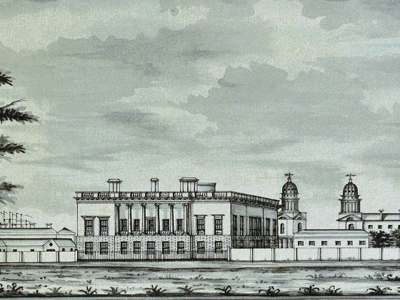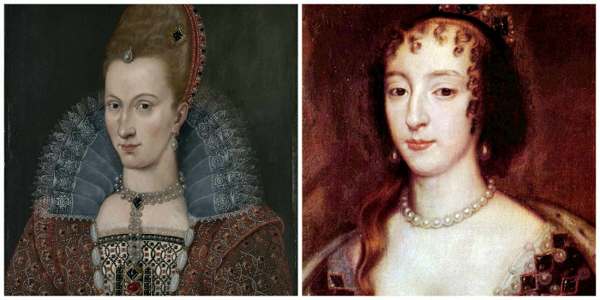The well-known Tulip staircase ghost photo was shot at this residence.
Greenwich is where Queen’s House is situated in London. In 1616, King James I hired the architect Inigo Jones to create a residence for his wife Anne of Denmark.
Jones’ creation signaled a change in English design. It was England’s first neoclassical structure. It stood in sharp contrast to the prevalent Elizabethan architecture of the time, which frequently featured red bricks, turrets, and towers.

The King was trying to make amends with this new residence. After his wife accidently killed his beloved dog while going on a hunt, he had expletives in front of her. Despite this, Anne was never going to live there. She passed away in 1617, only the first level had been finished.
For his French wife, Henrietta Maria, Charles I, King James’s son, ordered that construction on the house resume in 1629. In 1836, it was completed. She did not, however, reside there for a very long time. During the Civil War, she was compelled to flee to France. She learned her spouse had been killed while she was in exile.
After her son Charles ll was restored to the throne, Henrietta left for England. Up until 1662, she resided at Queen’s House.
George lll donated the home to a charity in 1805. It changed its name to the Royal Naval Asylum for sailor orphans.
The National Maritime Museum was located in this structure in 1934. The Royal Museums of Greenwich now owns it, and its art museum features pieces by Gainsborough, Reynolds, Turner, and Hogarth.
The Queen’s House gained notoriety in the 1960s when a ghost was captured on camera on a Tulip staircase that is located just to the left of the residence’s Grand Hall.
Lies, not tulips, are the design on the iron handrail of this staircase.
The Tulip stairway was England’s first self-supporting stairway.In 1966, while on a trip to the Queen’s House, retired Reverend Ralph Hardy and his wife from White Rock, British Columbia, Canada, took a picture of this lovely stairway.
They didn’t notice there was a problem with the picture they shot of the stairs until they got home and had their film developed. An unexpected image appeared.

It was a cloaked figure, and it seemed to be chasing after another figure as it up the steps. When they took this picture, the reverend and his wife insisted the staircase was free of obstructions.
The original negative was reviewed by Kodak experts, who came to the conclusion that it had not been tampered with.
A year later, the property was visited by and investigated by seven members of England’s Ghost Club. They had a séance but came up empty-handed.
However, according to several witness accounts, the Queen’s House is eerie. People frequently describe hearing phantom footsteps and seeing shadowy figures close to the Tulip staircase.
Slamming doors and children’s choral chanting may be heard. Visitors said they were pricked by an invisible hand.
At the foot of the staircase, one pale female phantom can be seen hastily mopping up blood from the floor. According to legend, a maid was killed by being tossed 50 feet to her death from the topmost banister 300 years ago.
A recent encounter was recorded in 2002 by a gallery assistant. When he noticed the Bridge Room door closing on its own, he was having a conversation about a tea break with two colleagues.
He then observed a woman gliding across the balcony and through the west balcony’s wall.
The assistant claimed he became very chilly and that the hair on his arms and neck sprang up because he could not believe what he was seeing.
He quickly hurried to a location where they could observe the Queen’s Bedroom with his colleagues. They all observed an object move through the anteroom and emerge from the wall.He claimed that the female ghost was wearing a white-grey crinoline outfit.

